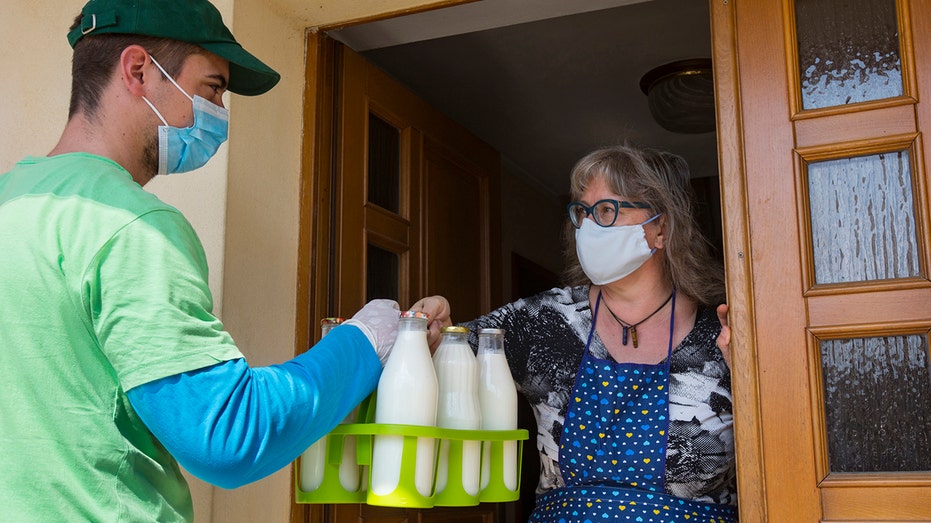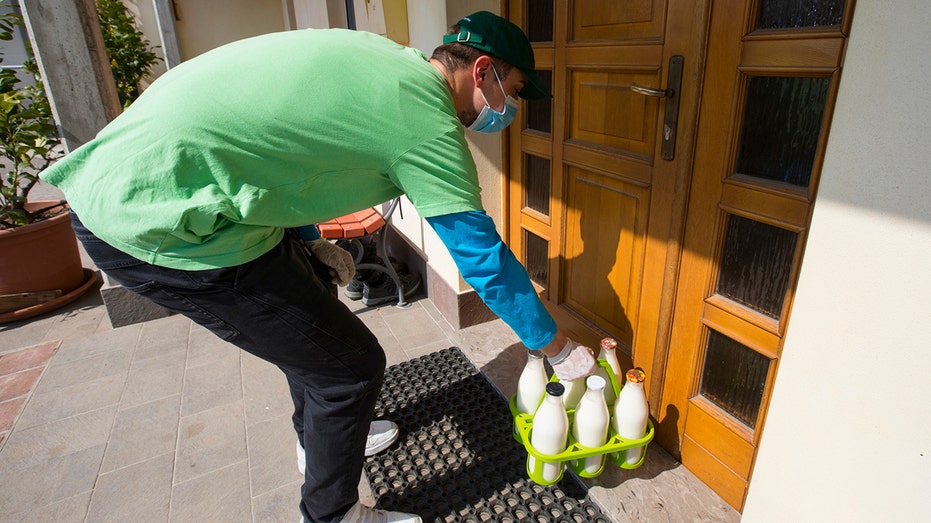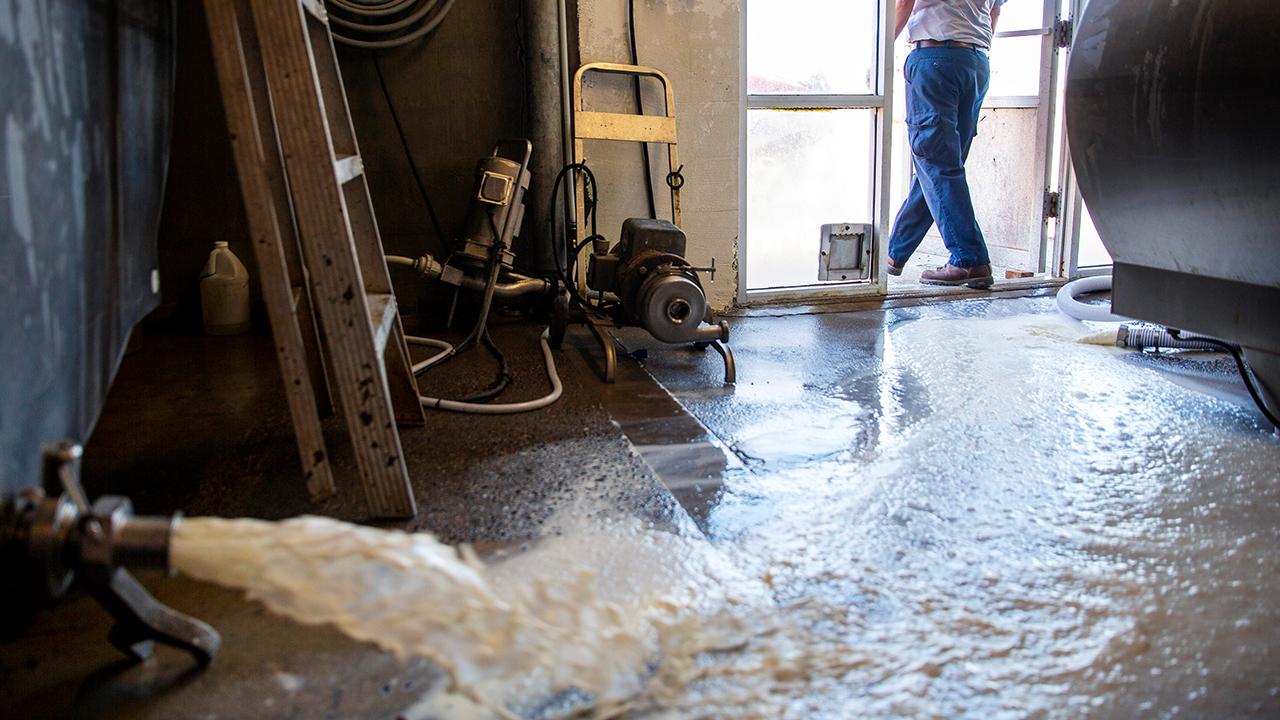The milkman is back: Covid lockdowns rekindle demand for dairy delivery
Delivery is a profitable business line, bringing in about $10,000 in sales a week
Get all the latest news on coronavirus and more delivered daily to your inbox. Sign up here.
The glass bottles are gone. The cream-topped milk of yore has been replaced by oat milk, almond milk and even a Snickers-flavored drink. But the milkman is back, summoned by customers eager for home delivery in a world changed by pandemic.

A delivery person brings milk to a customer during the coronavirus quarantine.
Get all the latest news on coronavirus and more delivered daily to your inbox. Sign up here.
At Wade's Dairy in Bridgeport, Conn., the novel coronavirus has turned demand on its head and opened the door to a new -- old -- business idea. Wade's had previously spent a century offering home delivery, but shut it down in 1992. Customers had dwindled, wooed by grocery stores offering cheaper milk that kept longer. Women had gone off to work, leaving no one home to accept deliveries.
The coronavirus fixed that last issue. Everyone is home now -- even if they are working -- and they want their milk. Meanwhile, many of the clients that Wade's had pivoted to serve -- restaurants, schools, corporate dining facilities -- are closed.
"I never in a million years would have thought home delivery would come back like this," said Doug Wade Jr., president of Wade's Dairy.
CORONAVIRUS FORCES DAIRY FARMERS TO DUMP MILK MEANT FOR RESTAURANTS
In April, he started a service that charges a $10 fee in exchange for crates filled with everything from eggs to cheese to yogurt placed on doorsteps. More than 250 customers in 25 towns have signed up. The classic full-fat chocolate milk is a top seller, but overall, Americans' taste for dairy has changed a lot over the years.
"Cow's milk is kind of a black eye out there," he said, acknowledging he has to sell the dairy-free options. "I'm hopeful that the tide will turn one day and people will say, 'Why am I spending so much money on oat milk?' "
Delivery is a profitable business line, bringing in about $10,000 in sales a week. He recently purchased a new 14-foot truck especially for the operation.
"Everyone said, 'Do you really want to invest in this?' " Mr. Wade, 66 years old, said. "That's the million-dollar question."
Mr. Wade still remembers the first home deliveries he tagged along for as a child in the early 1960s. Popping open a clamshell door, he would climb into the milk truck -- no refrigeration, no seat belts, not even a seat.
"You sat on a milk crate. You just bounced around the road." Glass milk bottles were crowded behind him. "Every bump you hit, it was just clink clink clink."
Mr. Wade's great-grandfather started doing business with a horse and buggy, selling raw unpasteurized milk from his own cows to neighbors. They ladled the liquid out of his communal can into whatever containers they had. It cost a couple pennies a quart and the route was twice daily, so people could have milk for breakfast and lunch.
CORONVIRUS SENDS MILK PRICES SPIRALING
At its peak, Wade's Dairy had more than 3,000 home-delivery customers -- every house on the block in some neighborhoods, Mr. Wade said. The business evolved into a dairy processing plant, pasteurizing milk from local farms.
By the end of the 20th century, it fully shifted to distribution, accepting deliveries on tractor-trailers, storing products like lemonade and cream in a now 7,000-square-foot refrigerated facility and taking the items to clients. Wade's has nearly 80 employees, including 40 drivers and a night crew, who can load 270,000 pounds of goods onto trucks in one shift.

The coronavirus pandemic has brought back demand for home milk delivery.
The pandemic jolted the business. Area school systems shut down essentially overnight in March, leaving Wade's with 400,000 half-pints of milk -- $75,000 of inventory -- set to expire soon. Mr. Wade experimented with a novel fix: freezing the flavored varieties. Since they are fat-free, the milk doesn't separate when thawed, he said. Ultimately, he only lost $8,000 on that supply.
Still, the company is owed about $225,000 by customers who can't pay, and Mr. Wade worries about how restaurant customers will survive. That part of his business is down about 75%.
"This time of year we would be booming," he said, with amusement parks buying up soft-serve ice-cream mixes. But the attractions are all shut down.
His delivery business model could expire when normal life returns. But he is driven by nostalgia, too.
GET FOX BUSINESS ON THE GO BY CLICKING HERE
He recently drove to Massachusetts to purchase a vintage hand-cranked cream separator, which spins milk to divide the fattier bits from the skim. He can tell the difference between a milk bottle from 1940 and one from 1950. And despite his age and asthma, he can't keep away from his office, which is decorated with about 1,000 milk bottles spanning the decades.
"I probably shouldn't be coming into work, but you know, this is my life, " he said. "I'm a milkman."
CLICK HERE TO READ MORE ON FOX BUSINESS




















